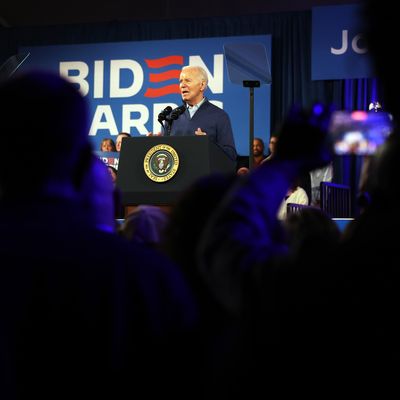
U.S. presidents tend to not go out and push the Federal Reserve around. Trump did it, of course — there’s hardly a norm or tradition he didn’t break — and he did it in his typical way, calling the Fed’s executives a bunch of “boneheads” for not sending interest rates down below zero. So last week, when Joe Biden appeared to be nudging the Fed, it was a surprise. “I can’t guarantee it, but I bet — you betcha — those rates come down more, because I bet you that that little outfit that sets interest rates, it’s going to come down,” he said, according to Bloomberg. (He was referring to the Fed’s committee that sets the bar for interest rates.) Then again, Biden wasn’t saying anything that was all that controversial. Inflation, the prime reason for higher interest rates, has looked to be on its last legs and far from the raging monster that was wreaking havoc upon the economy in 2022. The Fed’s chair, Jerome Powell, had said rates were probably going to fall. Wall Street was gambling on three rate cuts by the end of the year. And Biden wasn’t calling anybody a dog-faced pony soldier or something. If predicting a rate cut was a gamble for the president, the odds were, as of last week, short.
But on Tuesday, the Labor Department released a fundamentally confusing inflation report for February — one that, at least initially, looked like a bad sign for Biden’s big bet. It showed prices had ticked up in February. The cost of living was now up to 3.2 percent for the year, thanks in large part to the price of gas (which the Fed doesn’t care about) and the cost of shelter (which it does). It seemed to fly in the face of the criteria Powell wanted to meet before cutting rates, which he articulated at a press conference after the January Fed meeting, as “greater confidence that inflation is moving sustainably down to 2 percent” — that being the Fed’s target rate. But Wall Street kind of shrugged. Markets went up, and the expectation that the Fed would start to cut rates in a few months only got firmer. All this together means that the Fed is likely “to begin the easing cycle in June,” according to a note from Goldman Sachs economist Jan Hatzius. What happened?
Understanding inflation can often feel like a game of three-card monte — just when you think you’ve got it, it turns out the right answer was off somewhere else where you weren’t looking. The Consumer Price Index has long been known as an overly broad gauge of prices, at least from the Fed’s perspective, since central-bank policy doesn’t have much of an effect on the price of food or energy. There is a “core” gauge that strips out those costs, and a whole series of even narrower ways to slice and dice consumer prices, some of which have attracted Powell’s attention as inflation changed and shifted during the last few years. Over at The Wall Street Journal, Fed whisperer Nick Timiraos, along with “Heard on the Street” reporter Justin Lahart, published another theory: The Fed is really looking at a whole other measure of inflation, the Personal Consumption Expenditure, which tracks what people actually buy, rather than the price levels of goods and services in the economy. That measure — better reflecting consumer behavior, particularly among those who are shopping around for better deals — has been getting closer to Powell’s 2 percent goal.
Then again, Wall Street may have been bracing for even worse news. It was only in December when the markets were absolutely convinced that inflation was dead and rate cuts were coming as soon as March. By last week, that thesis had peeled out and gone into reverse, with Larry Summers coming out and leading the call that the Fed may not cut rates at all this year — and may even hike them again. The reality is that the inflation report was about where most economists expected it to be. Normal? In this economy? What a concept. That the economy might be more like this in the coming months may be the biggest reason of all that Biden’s big bet could pay off.






























